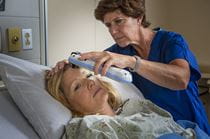Banu Onaral, PhD

Onaral is an expert in translational research and biomedical signal processing in ultrasound and optics. She has led major research and development projects sponsored by the National Science Foundation (NSF), National Institutes of Health (NIH), Office of Naval Research (ONR), DARPA and Department of Homeland Security (DHS).
Onaral's translational research efforts for rapid commercialization of biomedical technologies developed at Drexel and its partner institutions have resulted in the creation of the Translational Research in Biomedical Technologies program. This initiative brings together academic technology developers with entrepreneurs, regional economic development agencies, as well as local legal, business, and investment communities.
Onaral's professional services include chair and membership on advisory boards and strategic planning bodies of several universities and funding agencies, including service on the National Science Foundation's Engineering Advisory Board and on its proposal review panels and study sections. Her professional responsibilities have included service on the editorial board of journals and the CRC Biomedical Engineering Handbook as Section Editor for Biomedical Signal Analysis. She served as President of the IEEE Engineering in Medicine and Biology Society (EMBS), the largest member-based biomedical engineering society in the world.
